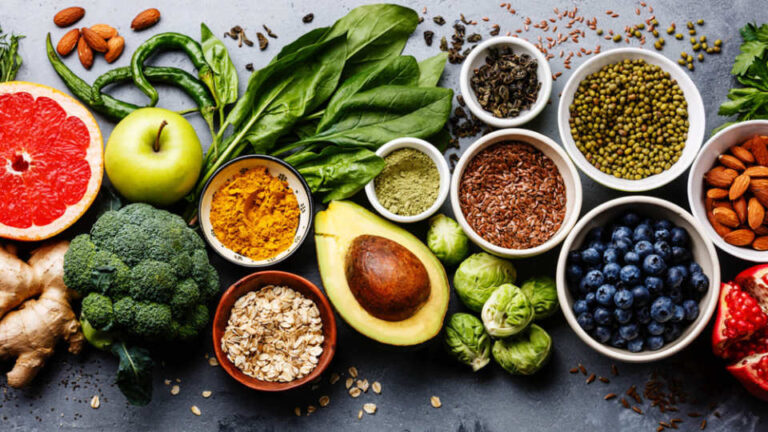Fibromyalgia: Must-Eat and Don’t-Touch Foods
There’s no cure-all when it comes to fibromyalgia. However, fibromyalgia may be better managed by diet, which can improve your quality of life with fibromyalgia. Specifically, fibromyalgia-friendly foods can prevent pain flare-ups and boost your energy levels. Let’s look at the ideal diet for a fibromyalgia patient, including foods that help and hurt your body.

Of course, there’s no one diet for fibromyalgia patients. You should craft a fibro-friendly diet that works with your needs and preferences. Sometimes this will take some trial-and-error to get right. To help you get there, keep a food diary of what you eat and how you feel to see if you can spot any trends. For example, some fibro patients find that they feel worse after eating gluten. These insights are only possible if you have a clear record of what you’re putting in your body. Keep a food diary to help with customizing your fibro-friendly diet.
Must-Eat Foods
Let’s start with the foods that you should fill your plate with. Try to eat as many plant-based foods as possible, with some key lean meats. A fibro-friendly diet closely follows the Mediterranean diet, which consists of fresh fruits and vegetables, as well as fish, nuts and olive oil. If you’re not big on fish, you can find some excellent recipes to spark your interest here.
1. Antioxidants
Antioxidants are anti-inflammatory compounds found in some fruits and vegetables that help stop cell damage. Antioxidants may also protect against cancer and heart disease. For fibromyalgia, antioxidants are ideal.
Antioxidant-rich foods:
- Grapes
- Berries
- Nuts
- Leafy-greens (kale, broccoli, spinach)
- Sweet potatoes, carrots, squash
- Whole grains
- Beans
- Fish
2. Amino acids
Amino acids are compounds that make up protein. They are the building blocks of many vital processes in the body, including transporting nutrients, building muscle and keeping your immune system strong. For a fibro patient, amino acids can keep the body running smoothly and prevent pain.
Amino acid foods:
- Lean meats
- Eggs
- Beans
- Nuts and seeds
- Whole grains
- Quinoa and soybean
- Lentils
- Mushrooms
- Low-fat cheese
3. Omega-3
Omega-3 is another anti-inflammatory compound that’s known to relieve pain, which is an ideal match for fibro sufferers.
Omega-3-rich foods:
- Fish
- Nuts
- Seeds
- Soybeans
4. Vitamin B-12
B-12 is the nutrient that helps make red blood cells, which carry oxygen around the body. If you’re low on B-12, you’ll feel tired and weak, making your fibro symptoms worse.
B-12-rich foods:
- Eggs
- Beef, chicken, fish
- Low-fat milk, yogurt and cheese
5. Phytochemicals
Phytochemicals are plant-based compounds that can boost your health, since they’re nutrient-rich. For a fibro patient, phytochemicals are great for preventing a range of conditions and keeping your body running smoothly.
Phytochemical-rich foods:
- Whole grains
- Beans and legumes
- Nuts and seeds
- Herbs and spices, including turmeric, red pepper, cloves, ginger, cumin, basil, rosemary and garlic.
6. Magnesium
Magnesium is another key compound that’s involved in producing energy and regulating blood sugar. It’s great for boosting your energy levels during the day and keeping your muscles and bones strong.
Magnesium-rich foods:
- Leafy greens
- Quinoa
- Almonds
- Bananas
- Dark chocolate
- Avocado
- Tofu
7. Vitamin D
Vitamin D has been specifically studied in fibro patients, as many have been tested for low levels of vitamin D. Vitamin D is important for absorbing calcium, which keeps your bones healthy.
Vitamin-D-rich foods:
- Fish
- Mushrooms
- Leafy greens
- Cheese
Don’t-Touch Foods

Now that you have a good sense of what foods to help enrich your diet and take away your pain, let’s look at those foods that are best to avoid.
8. Glutamate
Not all glutamates are bad, but this amino acid in excess can negatively stimulate the body. In particular, free glutamate, which is found in processed foods, can increase inflammation. Try to avoid eating unnatural sources of glutamate, including ingredients like MSG, anything hydrolyzed, soy protein and sauce, flavoring, pectin and corn syrup. If you don’t know what the ingredient is, it’s probably not good for you.
9. Processed foods
In general, processed foods are also highly inflammatory and can make your fibro pain much worse. Foods like chips, cookies, cakes and breads can inflame your joints and make you feel tired.
10. Artificial sweeteners and food additives
Sugar – especially artificial sugar – is inflammatory and spikes your blood pressure. It also can make you fatigued and stressed. Skip the sugar!
11.Alcohol and caffeine
Alcohol and caffeine are stimulants that can increase your pain and inflammation. Try to limit alcohol and caffeine use so that your body can find a better balance.
12. Gluten
If you’re struggling with pain, you may want to look into gluten sensitivity. Many fibro patients find themselves with gluten allergies, which can really impact your musculoskeletal system.
Final takeaway
Take control of your fibromyalgia by watching what you eat. You’ll find that by tweaking your diet, you’ll have more energy, less pain and an overall balanced body. You can also make lifestyle changes to accompany your new fibro-friendly diet – it’s up to you!
About Dr. Brent Wells
 Dr. Brent Wells is a graduate of the University of Nevada where he earned his bachelor of science degree before moving on to complete his doctorate from Western States Chiropractic College. He founded Chiropractors Wasilla in Alaska. He became passionate about being in the chiropractic field after his own experiences with hurried, unprofessional healthcare providers. The goal for Dr. Wells is to treat his patients with care and compassion while providing them with a better quality of life through his professional treatment.
Dr. Brent Wells is a graduate of the University of Nevada where he earned his bachelor of science degree before moving on to complete his doctorate from Western States Chiropractic College. He founded Chiropractors Wasilla in Alaska. He became passionate about being in the chiropractic field after his own experiences with hurried, unprofessional healthcare providers. The goal for Dr. Wells is to treat his patients with care and compassion while providing them with a better quality of life through his professional treatment.


